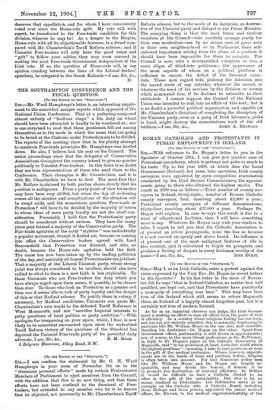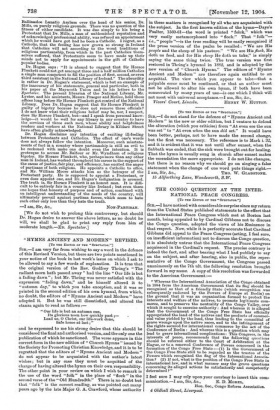SIR,—May I, as an Irish Catholic, enter a protest against
the views expressed by the Very Rev. Dr. Hogan in recent letters to the Spectator ? In his last letter in the issue of Novem- ber 5th he says " that in Ireland Catholics, no matter how well qualified, are kept out, and that Protestants have practically a monopoly of everything over here." This may have been true of the Ireland which still seems to colour Maynooth ideas, an Ireland of a happily almost forgotten past, but it is certainly not true of modern Ireland.
As far as an impartial observer can judge, the Irish Govern- ment is making an effort to man all offices from the point of view of efficiency. In a country where religious feeling has run high, and has not yet entirely subsided, this is naturally displeasing to partisans like Mr. William Moore on the one side, and—notwith- standing his disclaimer—Dr. Hogan on the other. Apart from Government offices, partisanship is still shown in appointments ; not, of course, in the more liberal professions, as Dr. McWeeney, in reply to Dr. Hogan's paper on the Catholic Association at Maynooth, said " in his profession at least, Catholics could attain the highest positions,"—meaning, I take it, such positions as were in the gift of the medical profession. Where, however, appoint- ments are in the hands of local and partisan bodies, religion is often taken into account. For this disastrous policy men like Mr. William Moore and Dr. Hogan are largely re- sponsible, and may divide the honour, if honour it be to promote the destruction of national efficiency. In Belfast it would be difficult to have a Catholic elected to an office in the gift of the municipality. But this is by no means confined to Protestants. Let Ballinasloe serve as an example on the Catholic side. A Catholic Board, including three Bishops and three priests, appointed the junior medical officer, Dr. Kirwan, to the medical superintendentahip of the
Ballinaaloe Lunatic Asylum over the head of his senior, Dr. Mills, on purely religious grounds. There was no question of the fitness of either candidate. It was due simply to his being a Protestant that Dr. Mills, a man of unblemished reputation and of acknowledged professional ability, was refused an appointment which he would have got had he been a Catholic. I regret, as a Catholic, that the feeling has now grown so strong in Ireland that Catholics will act according to the worst traditions of religious partisanship, from which in the past Catholics them- selves suffered, that Protestants seem to have made up their minds not to apply for appointments in the gift of Catholic populat bodies.
Dr. Hogan says : "It is absurd to suggest that Sir Horace Plunkett could not get amongst three and a half million Catholics a single man competent to fill the position of first, second, or even third assistant in the National Library of Ireland." The absurdity is rather in Dr. Hogan's statement, which is but an example of the inaccuracy of his statements, general and particular, both in his paper at the Maynooth Union and in his letters to the Spectator. The present librarian of the National Library, Mr. Lyster, and his assistants, Messrs. Praeger and McGee, held these .offices long before Sir Horace Plunkett got control of the National Library. Does Dr. Hogan suggest that Sir Horace Plunkett is guilty of bigotry because he does not remove these officials ? I do not know what their religious belief may be, nor, I suspect, does Sir Horace Plunkett, but—and I speak from personal know- ledge—it would be well for any library in any country to have the services of three such men, whose ability and helpfulness readers and workers at the National Library in Kildare Street have often gladly acknowledged.
Dr. Hogan disclaims any intention of exciting ill-feeling between Protestants and Catholics. The effect of one's words does not always follow the intention. Moreover, such misstate- ments of fact in a country where partisanship is still an evil to be reckoned with make one doubt even the intention. It is grotesque to accuse Mr. Balfour or Mr. Wyndham of religious bigotry. Sir Horace Plunkett, who, perhaps more than any other man in Ireland, has worked throughout his career in the support of the cause of justice, fair play, and efficiency, has excited the anger of partisans of both religions. He appoints a Catholic to office, and Mr. William Moore attacks him as the betrayer of the Protestant party. He is supposed to appoint a Protestant, or even does appoint one, and Dr. Hogan's indignation is aroused. The truth is, Sir Horace Plunkett is an honest man. It is diffi- cult to be entirely fair in a country like Ireland ; but even there one hopes that honesty of purpose and of action, combined with an intelligent understanding of the needs of the country, will ultimately prevail against partisan forces, which seem to hate each other only less than they hate the truth.
—I am, Sir, &c., NON-PARTISAN.
"HYMNS ANCIENT AND MODERN" REVISED.











































 Previous page
Previous page